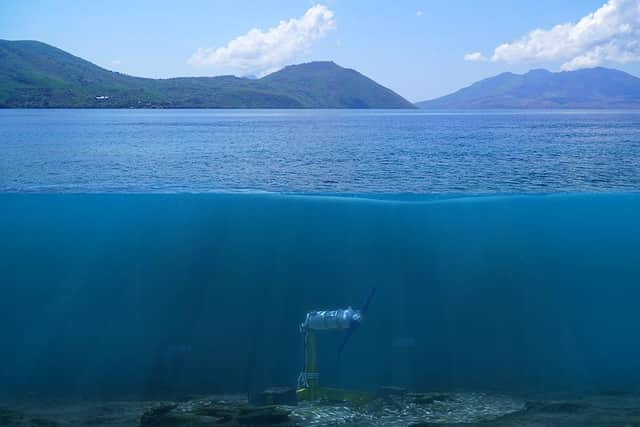Scottish renewable energy firm wins funding to scope tidal turbine farm in Asia
Nova Innovation has been awarded £200,000 of investment from Innovate UK to examine the feasibility of installing a 7MW array of tidal turbines in Indonesia.
The firm will deploy cutting-edge 100kW tidal turbines which have already been successfully demonstrated in Scotland, powering homes and businesses in Shetland since 2016.
Advertisement
Hide AdAdvertisement
Hide AdThe turbines will be installed in the Larantuka Strait, which lies between the islands of Flores and Adonara and has one of the strongest tidal currents in Indonesia.
The Feasibility of Larantuka and Indonesian Tidal Energy (Flite) project is the first in Asia for the Edinburgh-based company.
Nova Innovation chief executive Simon Forrest said: “Our goal is to kick-start the development of tidal stream as a sustainable and abundant energy source for countries across the world.
“Indonesia is blessed with vast tidal energy resources that can be harnessed to generate clean, predictable, sustainable energy for the country.
“By working closely with our Indonesian partners we will accelerate the harnessing of this untapped resource, capable of powering Indonesia for generations to come.”


Indonesia, which is made up of 17,500 islands, is home to more than 270 million people.
The country's electricity grid is currently dominated by fossil fuels – coal, gas and oil – which together accounted for 83 per cent of electricity generation in 2020.
However, the Indonesian government has committed to increase renewable energy production by 2030, and the country’s abundant tidal energy resources offer a significant opportunity to decarbonise its economy.
Advertisement
Hide AdAdvertisement
Hide AdNova will partner with Indonesia’s Institut Teknologi Sepuluh Nopember (ITS) to conduct on-site technical and socio-economic research to support the business case for building the tidal array.
Bambang Pramujati, vice rector of the university, said: “The eastern region of Indonesia has the characteristics of an archipelago and abundant natural energy sources.
“The electricity supply system in this region has to deal with a variety of geographical factors, uneven population distribution and an uneven distribution of energy needs.
"Collaborative research between ITS and Nova Innovation will deliver a feasibility study for a tidal energy array in the Larantuka strait with the aim of answering economic and technical feasibility issues and providing confidence for investors.”
Nova Innovation designs, builds, installs and operates tidal energy turbines.
The company already has offices in Scotland, Ireland, Wales, Belgium and Canada and is expanding into new international markets.
The Nova team met with members of the Indonesian delegation to COP26 in Glasgow to discuss the potential for tidal energy in the country.
MP Mike Freer, UK government minister for exports, commended Nova’s work and welcomed the funding.
Advertisement
Hide AdAdvertisement
Hide AdHe said: “Congratulations to Nova Innovation on their grant from Innovate UK.
“COP26 showed us all how exciting initiatives like this can help the UK – and the planet – build back greener.
“Clean growth is at the heart of our trade policy and the deals we are negotiating around the world will drive green exports and investment, create jobs and tackle the threat of climate change.”
A message from the Editor:
Thank you for reading this article. We’re more reliant on your support than ever as the shift in consumer habits brought about by coronavirus impacts our advertisers.
If you haven’t already, please consider supporting our trusted, fact-checked journalism by taking out a digital subscription.
Comments
Want to join the conversation? Please or to comment on this article.
